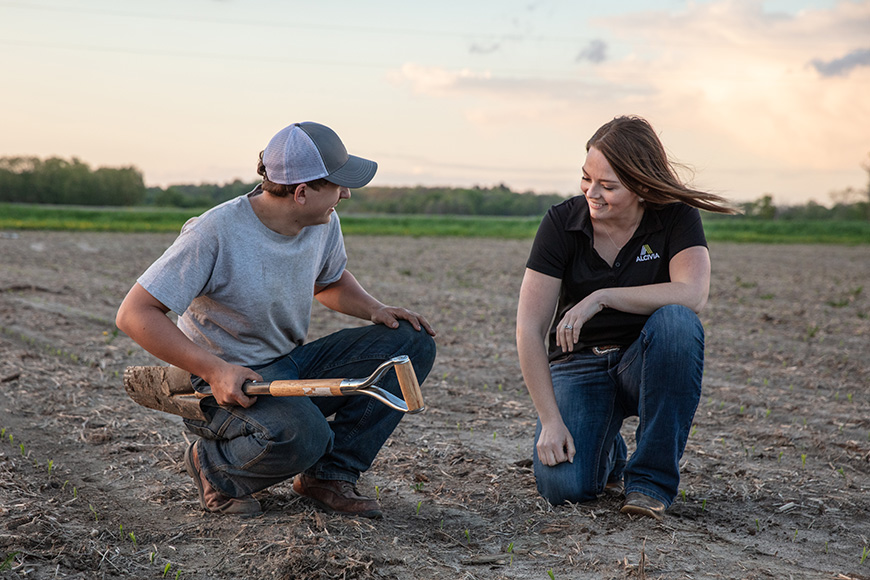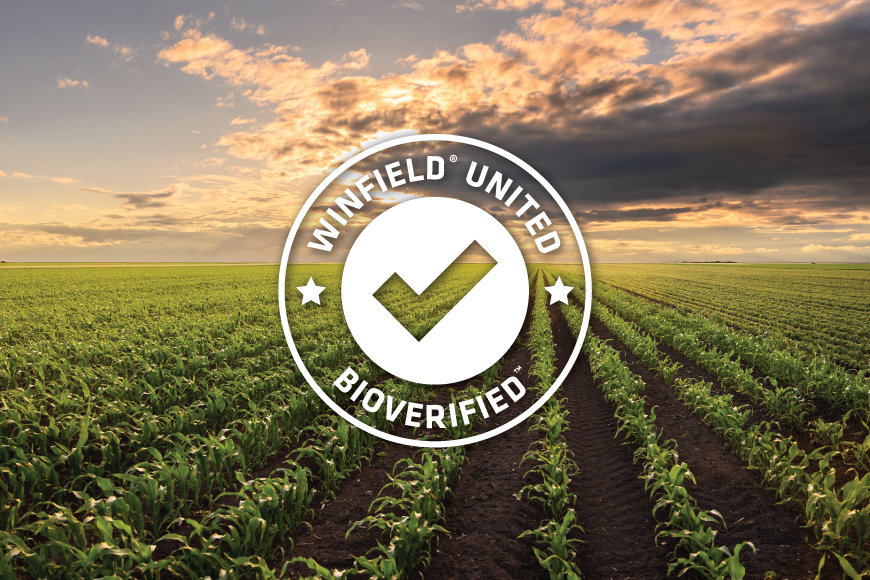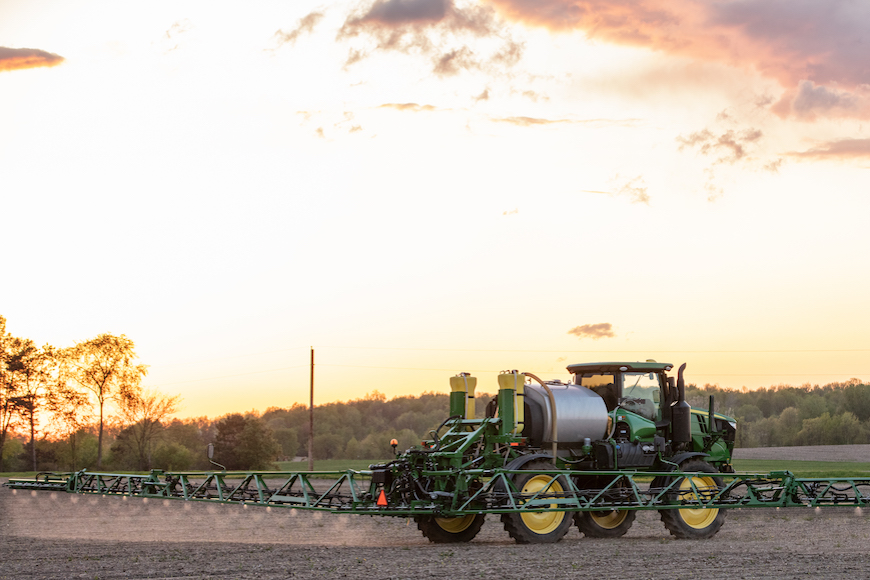Biological Seed Treatments: Enhancing Plant Health From The Start

There are many different ways to apply biologicals, one option being seed treatment. Placing your seed in the soil coated with a biological partner could help enhance performance in a multitude of ways. But is it worth it? Is it proven? Which seed treatments should you be prioritizing?
Let’s break it all down and discover the value biological seed treatments could bring to your operation.
What Are Biological Seed Treatments?
Biological seed treatments are organisms or compounds derived from natural sources that are applied to seeds before planting. These treatments typically include beneficial bacteria, fungi, amino acids and other microorganisms that promote plant growth, enhance nutrient uptake or protect against pests and diseases.
Biological seed treatments are typically designed to complement or enhance conventional management practices and chemistries. They uniquely work in harmony with the natural soil ecosystem, which can provide additional soil health benefits.
Biological seed treatments are an attractive option for many growers because they can typically be added easily into existing seed treatment packages or mixed in at the planter box, requiring little to no extra time, fuel or labor to implement. But their impacts, when used in the right conditions, can help enhance plant health and performance.
Biological Seed Treatments and Plant Performance
When planting, seed quality, uniform germination and seedling vigor are top priorities. These factors have season-long impacts that contribute significantly to overall crop performance. Biological seed treatments containing beneficial microbes, such as mycorrhizal fungi, rhizobia and other bacteria, can help establish early relationships with plants, leading to biostimulant effects such as plant-growth enhancement, increased nutrient uptake and improved plant resilience to abiotic stress.
For example, Dash™ PBS for soybeans and Dash™ PBC for corn from WinField United are seed lubricants enhanced with nutrients and biostimulants you can apply right at the planter box instead of your conventional talc and graphite. With the power of eight synergistic strains, these products are designed to enhance yield potential by:
• Helping support germination
• Boosting early plant vigor
• Facilitating microbial nutrient release
• Reducing dust vs. 80/20 talc/graphite
Biologicals, including WinField United’s new Ascend® ST3™ plant growth regulator (PGR), can promote plant growth through various mechanisms. Ascend ST3 PGR is a three-way PGR mixture that can help accelerate seedling development, improve germination and enhance root growth to mitigate early season plant stress. With its unique ratio of auxin, gibberellic acid and cytokinin, Ascend ST3 PGR delivers the right amount of PGRs at the right time to protect seeds and boost early-season plant health.
Biological Seed Treatments and Disease Control
There are many soilborne pathogens a seed faces that can reduce its potential before it even has a chance to establish itself. Certain biological seed treatments contain natural compounds that inhibit the growth of harmful pathogens. This natural defense mechanism can complement and help reduce reliance on chemical pesticides while fostering a healthier and more resilient crop.
Two products with the WinField United BioVerified designation fall into this category: Heads Up® and CeraMax® biological seed treatments.
Heads Up uses system acquired resistance, triggering natural defenses in the plant upon germination. For growers managing fields susceptible to white mold and sudden death syndrome (SDS), Heads Up provides a valuable additional mode of action against the diseases, strengthening the plant’s ability to fight them off.
CeraMax, on the other hand, contains the active ingredient Natamycin, a biological molecule produced by soil bacteria that prevents soil-borne fungal diseases like Rhizoctonia spp. and Fusarium virguliforme, the causal agent of SDS. CeraMax delivers environmental stewardship and seed safety attributes not offered with most synthetic seed treatments. CeraMax has shown a 2 bu/A average yield increase on soybeans under early planting conditions.1
While Heads Up and CeraMax are focused primarily on pathogen prevention and control, some biological seed treatments perform more than one primary function. Take Vault® IP Plus seed treatment from BASF, for example. This EPA-registered product provides three modes of action. An optimal rhizobia strain for inoculation, Bacillus amyloliquifaciens for extended disease control of Fusarium and Rhizoctonia, and Bacillus subtilis for plant health and nutrient acquisition. With proven agronomic and economic benefits, Vault IP Plus has also received the WinField United BioVerified designation.
How to Choose The Right Biological Seed Treatment
There are many factors to consider when choosing the right product for your farm. Your local WinField United retailer is the best resource to use in navigating the market. They have an intimate understanding of what works best in your area and are likely the ones making your seed treatment application. As you’re talking with your trusted advisor, here are a few questions to consider:
1System + Ceramax compared against Omission – Ceramax. 70%-win rate with 3.8 bushel/acre average positive yield response.
All photos are either the property of WinField United or used with permission.
© 2025 WinField United. Important: Before use always read and follow label instructions. Crop performance is dependent on several factors many of which are beyond the control of WinField United, including without limitation, soil type, pest pressures, agronomic practices and weather conditions. Growers are encouraged to consider data from multiple locations, over multiple years and to be mindful of how such agronomic conditions could impact results. BioVerified, Ascend ST3 and WinField are trademarks of WinField United. All other trademarks are the property of their respective owners.
Let’s break it all down and discover the value biological seed treatments could bring to your operation.
What Are Biological Seed Treatments?
Biological seed treatments are organisms or compounds derived from natural sources that are applied to seeds before planting. These treatments typically include beneficial bacteria, fungi, amino acids and other microorganisms that promote plant growth, enhance nutrient uptake or protect against pests and diseases.
Biological seed treatments are typically designed to complement or enhance conventional management practices and chemistries. They uniquely work in harmony with the natural soil ecosystem, which can provide additional soil health benefits.
Biological seed treatments are an attractive option for many growers because they can typically be added easily into existing seed treatment packages or mixed in at the planter box, requiring little to no extra time, fuel or labor to implement. But their impacts, when used in the right conditions, can help enhance plant health and performance.
Biological Seed Treatments and Plant Performance
When planting, seed quality, uniform germination and seedling vigor are top priorities. These factors have season-long impacts that contribute significantly to overall crop performance. Biological seed treatments containing beneficial microbes, such as mycorrhizal fungi, rhizobia and other bacteria, can help establish early relationships with plants, leading to biostimulant effects such as plant-growth enhancement, increased nutrient uptake and improved plant resilience to abiotic stress.
For example, Dash™ PBS for soybeans and Dash™ PBC for corn from WinField United are seed lubricants enhanced with nutrients and biostimulants you can apply right at the planter box instead of your conventional talc and graphite. With the power of eight synergistic strains, these products are designed to enhance yield potential by:
• Helping support germination
• Boosting early plant vigor
• Facilitating microbial nutrient release
• Reducing dust vs. 80/20 talc/graphite
Biologicals, including WinField United’s new Ascend® ST3™ plant growth regulator (PGR), can promote plant growth through various mechanisms. Ascend ST3 PGR is a three-way PGR mixture that can help accelerate seedling development, improve germination and enhance root growth to mitigate early season plant stress. With its unique ratio of auxin, gibberellic acid and cytokinin, Ascend ST3 PGR delivers the right amount of PGRs at the right time to protect seeds and boost early-season plant health.
Biological Seed Treatments and Disease Control
There are many soilborne pathogens a seed faces that can reduce its potential before it even has a chance to establish itself. Certain biological seed treatments contain natural compounds that inhibit the growth of harmful pathogens. This natural defense mechanism can complement and help reduce reliance on chemical pesticides while fostering a healthier and more resilient crop.
Two products with the WinField United BioVerified designation fall into this category: Heads Up® and CeraMax® biological seed treatments.
Heads Up uses system acquired resistance, triggering natural defenses in the plant upon germination. For growers managing fields susceptible to white mold and sudden death syndrome (SDS), Heads Up provides a valuable additional mode of action against the diseases, strengthening the plant’s ability to fight them off.
CeraMax, on the other hand, contains the active ingredient Natamycin, a biological molecule produced by soil bacteria that prevents soil-borne fungal diseases like Rhizoctonia spp. and Fusarium virguliforme, the causal agent of SDS. CeraMax delivers environmental stewardship and seed safety attributes not offered with most synthetic seed treatments. CeraMax has shown a 2 bu/A average yield increase on soybeans under early planting conditions.1
While Heads Up and CeraMax are focused primarily on pathogen prevention and control, some biological seed treatments perform more than one primary function. Take Vault® IP Plus seed treatment from BASF, for example. This EPA-registered product provides three modes of action. An optimal rhizobia strain for inoculation, Bacillus amyloliquifaciens for extended disease control of Fusarium and Rhizoctonia, and Bacillus subtilis for plant health and nutrient acquisition. With proven agronomic and economic benefits, Vault IP Plus has also received the WinField United BioVerified designation.
How to Choose The Right Biological Seed Treatment
There are many factors to consider when choosing the right product for your farm. Your local WinField United retailer is the best resource to use in navigating the market. They have an intimate understanding of what works best in your area and are likely the ones making your seed treatment application. As you’re talking with your trusted advisor, here are a few questions to consider:
- What are my greatest agronomic challenges? Could a biological seed treatment help me address them?
- Where do I want to diversify my crop protection efforts to reduce reliance on and preserve chemistry?
- Which biological products have a clearly defined mode of action and proven performance?
- Which biological products are backed by the WinField United BioVerified designation?
1System + Ceramax compared against Omission – Ceramax. 70%-win rate with 3.8 bushel/acre average positive yield response.
All photos are either the property of WinField United or used with permission.
© 2025 WinField United. Important: Before use always read and follow label instructions. Crop performance is dependent on several factors many of which are beyond the control of WinField United, including without limitation, soil type, pest pressures, agronomic practices and weather conditions. Growers are encouraged to consider data from multiple locations, over multiple years and to be mindful of how such agronomic conditions could impact results. BioVerified, Ascend ST3 and WinField are trademarks of WinField United. All other trademarks are the property of their respective owners.





